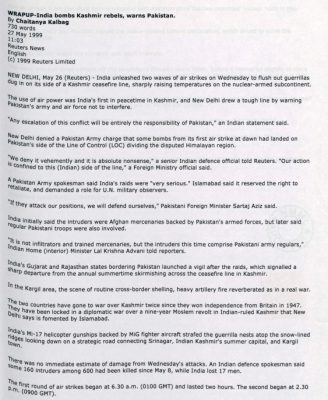WRAPUP-India bombs Kashmir rebels, warns Pakistan.
[Reuters]
Published date: 27th May 1999
27 May 1999
Reuters News
English
(c) 1999 Reuters Limited
NEW DELHI, May 26 (Reuters) – India unleashed two waves of air strikes on Wednesday to flush out guerrillas dug in on its side of a Kashmir ceasefire line, sharply raising temperatures on the nuclear-armed subcontinent.
The use of air power was India’s first in peacetime in Kashmir, and New Delhi drew a tough line by warning Pakistan’s army and air force not to interfere.
“Any escalation of this conflict will be entirely the responsibility of Pakistan,” an Indian statement said.
New Delhi denied a Pakistan Army charge that some bombs from its first air strike at dawn had landed on Pakistan’s side of the Line of Control (LOC) dividing the disputed Himalayan region.
“We deny it vehemently and it is absolute nonsense,” a senior Indian defence official told Reuters. “Our action is confined to this (Indian) side of the line,” a Foreign Ministry official said.
A Pakistan Army spokesman said India’s raids were “very serious.” Islamabad said it reserved the right to retaliate, and demanded a role for U.N. military observers.
“If they attack our positions, we will defend ourselves,” Pakistani Foreign Minister Sartaj Aziz said.
India initially said the intruders were Afghan mercenaries backed by Pakistan’s armed forces, but later said regular Pakistani troops were also involved.
“It is not infiltrators and trained mercenaries, but the intruders this time comprise Pakistani army regulars,” Indian Home (interior) Minister Lal Krishna Advani told reporters.
India’s Gujarat and Rajasthan states bordering Pakistan launched a vigil after the raids, which signalled a sharp departure from the annual summertime skirmishing across the ceasefire line in Kashmir.
In the Kargil area, the scene of routine cross-border shelling, heavy artillery fire reverberated as in a real war.
The two countries have gone to war over Kashmir twice since they won independence from Britain in 1947.
They have been locked in a diplomatic war over a nine-year Moslem revolt in Indian-ruled Kashmir that New Delhi says is fomented by Islamabad.
India’s Mi-17 helicopter gunships backed by MIG fighter aircraft strafed the guerrilla nests atop the snow-lined ridges looking down on a strategic road connecting Srinagar, Indian Kashmir’s summer capital, and Kargil town.
There was no immediate estimate of damage from Wednesday’s attacks. An Indian defence spokesman said some 160 intruders among 600 had been killed since May 8, while India lost 17 men.
The first round of air strikes began at 6.30 a.m. (0100 GMT) and lasted two hours. The second began at 2.30 p.m. (0900 GMT).
the senior Indian defence official said the air strikes would continue until the Afghan mercenaries were islodged from high ridges in Kashmir’s Drass-Kargil-Batalik sectors, “or until the Pakistanis pull the militants back to their side.”
The United States, Britain and France voiced concern about the air attacks. A U.S. spokeswoman in Delhi said Ambassador Richard Celeste had met Indian Defence Minister George Fernandes.
Washington has led western efforts to draw arch-foes India and Pakistan into the global regime for nuclear arms control since they conducted nuclear tests last year.
The air strikes mark the worst turn in relations with Pakistan since the two countries’ nuclear tests in May 1998 In February, India and Pakistan signed the peace-making Lahore Declaration, which aimed to solve the Kashmir dispute.
India’s air strikes shook the currency and stock markets.
The news knocked three percent off the benchmark Bombay share index, before it recovered slightly to close 2.14 percent down. But the Karachi 100-share index was dragged down 6.56 percent amid market fears that the conflict could escalate.
Indian Finance Minister Yashwant Sinha told Reuters the air strikes were only a passing blip. “There is no need for panic on this account. I think the problem will be sorted out quickly … “
The Indian rupee ended at 42.825/835 per dollar compared to its previous close of 42.7475/7525.
In Paris, Indian Foreign Minister Jaswant Singh dismissed concerns of a South Asian conflict. “Your apprehensions are entirely misplaced,” he told a reporter.
On a day of displays of strength, India also successfully launched its first rocket with commercial satellite payloads, and tested the naval version of a short-range missile.
(C) Reuters Limited 1999.






